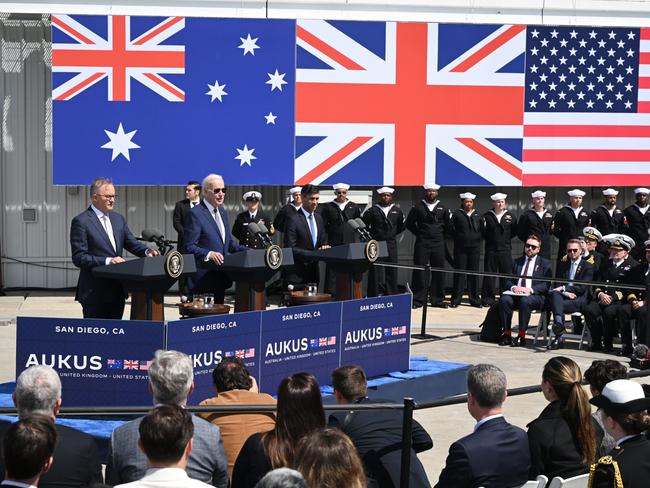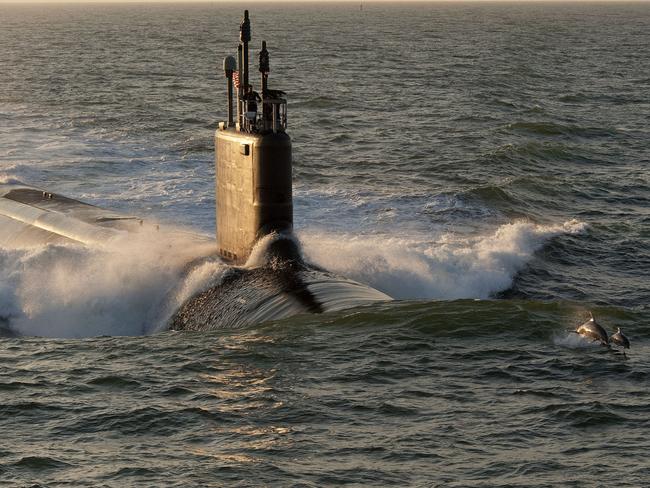AUKUS subs deal: How Aussies can cash in
Everyday Aussies can get a slice of the AUKUS submarine program by investing in stocks. Here are the top ten picks.
National
Don't miss out on the headlines from National. Followed categories will be added to My News.
Everyday Australians will be able to seek a slice of the AUKUS nuclear-powered submarine program by investing in companies on the local stock market.
There are not a lot of defence-focused companies listed on the Australian Securities Exchange, but many businesses with broader operations will have exposure to the huge volume of construction, engineering, manufacturing and other work required.

AMP head of investment strategy Shane Oliver said engineering companies such as Downer EDI were involved in government contracts, while BlueScope Steel could also offer exposure.
“You will have spin-off benefits for Australian companies – whether listed or unlisted,” Dr Oliver said.
Listed shipbuilder Austal already builds ships for the US Navy, but Baker Young managed portfolio analyst Toby Grimm said subs were “very different”.
He said communications, education and raw materials companies could also benefit but “there is limited certainty at this point to directly influence investors’ stock choices”.
“Contracts have yet to be termed, let alone tendered and won,” Mr Grimm said.
HOW AUSSIE BUSINESSES WILL BENEFIT
The AUKUS program will attract up to 20,000 small to medium Australian defence firms competing to supply the submarine industrial base in the three alliance countries.
While the nuclear-powered submarine program announcement focused on the shipyards of South Australia and Western Australia, defence experts say opportunities are national.
“I don’t think people fully appreciate the enormity of this because, and I don’t want to sound melodramatic, this is nation defining,” peak national body Australian Industry and Defence Network chief executive Brent Clark said.
“The supply chain for this will be very large, most prime contractors in Australia already have a supply chain of between 2000 and 3000 companies … there should be an enormous amount of opportunity for our 1500 members, it’s a great time to be part of the defence industry.”

Retired RAN Rear Admiral Mark Purcell has been involved in some of Defence’s largest and most complex acquisition and sustainment undertakings.
“It is very much a national endeavour, the other ship building programs that we have done through Adelaide which I have had experience with … the (Hobart-class) Destroyer involved very much every other state and territory contributing labour and workforce, some 10,000 to 20,000 companies from some very small business to multinationals,” Adm. (ret.) Purcell said.
“The level of complexity, the sheer size of these AUKUS submarines which are going to be large and the technology that goes into these things … tens of thousands of companies will be involved in whatever you can think about, valves, the generators, the pumps, the sophisticated electronics, the combat system.”
The Australian defence industry employs more than 61,600 people and contributed $10.6 billion to the Australian economy in the 2021-22 financial year.
Chief executive and founder of Melbourne-headquartered Cablex Michael Zimmer employs between 200 and 300 highly skilled workers, depending on programs, and has facilities in India and the UK focusing on defence and aerospace.
They produce electrical wiring systems, effectively the spaghetti of wires and panel systems for defence platforms and already do extensive military work.
Mr Zimmer said AUKUS was an exciting prospect but it was too early to work out yet how his firm could contribute but the government needed to look at policy to guide the industry.
Adelaide-based SME Acacia Systems, whose leading edge data analytics software is already aboard the Collins class submarines, agreed more detail was needed and clarity on overcoming traditional protectionist American trade policies.
“We’ve come up with the AUKUS deal now, in the next phase where all the detail gets nutted out we have to make sure that the right frameworks are in place so we can deliver to the US submarines,” chief executive Hordern Wiltshire said.
More Coverage
Originally published as AUKUS subs deal: How Aussies can cash in




